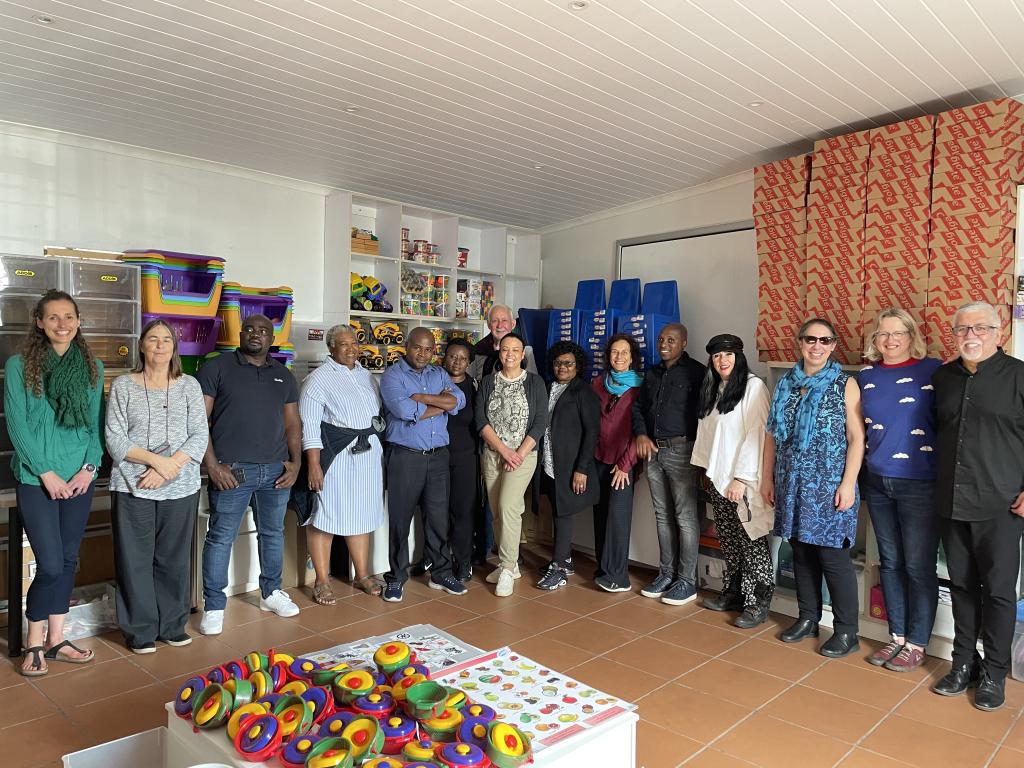Improving early learning for pre-school children in vulnerable contexts

The Children’s Institute hosted a week-long, multi-country research partner meeting in May, focusing on improving early learning for pre-school children in vulnerable contexts. The project is titled SIPP: Safe, Inclusive, Participative Pedagogy: Improving Early Childhood Education.
The interdisciplinary collaboration is a partnership between five academic partners – the University of Edinburgh; the University of Bethlehem; the University of Eswatini; the International Centre for Research and Policy on Childhood (CIESPI) at Pontifical Catholic University; and the Children’s Institute at the University of Cape Town (UCT). The South African arm of the project is led by local Principal Investigator and Senior Researcher at the Children’s Institute, Marsha Orgill, together with Children’s Institute Researcher Malibongwe Gwele and early childhood development (ECD) specialist Linda Biersteker.
Safe, inclusive and participative pedagogy
Currently, in its final year, the research project aims to explore, develop, and critically consider the conceptualisation and application of safe, inclusive participative pedagogy in early childhood education. The project sought to explore these concepts through community case studies in vulnerable settings in South Africa, Palestine, Brazil and Eswatini. The project focuses on children below the age of primary schooling, their families and their early childhood educators/caregivers in the four countries.
Governments across the world are moving to public provision of at least one year of compulsory pre‐school, creating a pivotal moment for: a) understanding the challenges and opportunities for such provision in different contexts; and b) contributing to thinking on what makes for quality in early childhood education. In South Africa, the National Development Plan articulates a vision that all children aged 4 – 5 will receive pre-school education, in addition to the existing Grade R or reception year for 5 – 6-year-olds.
While many countries have policies that speak to safe, inclusive participative pedagogy, there is a need to assess how these policies are understood and given effect in local communities. In this project we are seeking to contribute to the knowledge base on safe, inclusive participative pedagogy that is implementable in vulnerable contexts and that could be sustainable for governments, communities, and families.
Sharing ideas across contexts
As the project has a strong emphasis on community engagement and the co-creation of knowledge, the week-long meeting in May included introducing the international partners to the South Africa community partner to share ideas across contexts. True North, an NPO based in Cape Town, pioneers early childhood development (ECD) initiatives in the local Vrygrond and Overcome Heights community.
At the South Africa site, project members observed a vibrant and passionate collective of people in the local community, working together with other networked NGOs, who are dedicated to building a quality ECD service for children prior to primary school. This includes meaningful inclusion in the classroom and promoting participation for learners and their parents.
Findings from the South Africa site
Preliminary findings from the South Africa site show that ECD centres are considered as places of safety for children in vulnerable contexts – however taking an ecological perspective, ECD centres and children are not divorced from the realities of violence in their communities. While some ECD centres do receive government subsidies, challenges to inclusion include the need for parents to pay fees to centres who are themselves struggling with financial sustainability. Also, a lack of resources and adequate programming for children with disabilities persists.
Participation is mostly understood, but the full breadth of what participation means is not often practiced. Traditional interaction patterns based on teacher power and child subordination need to be thought about in more nuanced ways to promote full participation. Participation is sometimes viewed as one aspect of a daily or weekly programme not as an approach, practice or a pedagogy. Resources, space, and attitudes are a constraint and a barrier to implementing the right to participation. Fortunately, there are committed NPOs working toward these goals in the community site, there are however a range of challenges for which support is needed.
The meeting also included the launch of a conference dialogue series on participatory methodologies to decolonise research with children and young people. This dialogue series is in collaboration with the International and Canadian Child Rights Partnership (ICCRP), the South African arm of the ICCRP is led by local Principal Investigator in the Children’s Institute, Lucy Jamieson.
